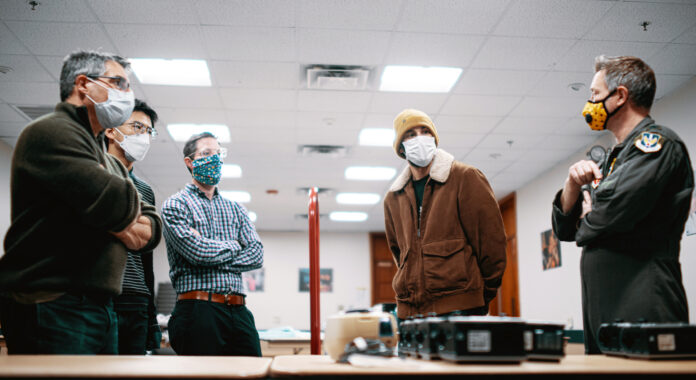
PROVIDENCE – Alex Hornstein considers himself a world tourist, of sorts. A former electrical engineer and computer scientist, Hornstein had traveled to various places that had struggling infrastructure to work on electrical matters, like solar power grids.
But, like everyone else, Hornstein watched and read countless news reports of hospitals around the world having ventilator shortages in trying to keep up with the growing COVID-19 pandemic that has claimed thousands of lives globally, including 150 in Rhode Island as of Sunday.
“I was like ‘well this is no good,’ but it was a familiar topic because you see it a lot in infrastructure-challenged places,” Hornstein said to Providence Business News. Hornstein then proceeded to speak with local pulmonologists and respiratory therapists for two straight weeks about what their needs are in order to properly treat virus-infected patients.
The answer was clear, Hornstein said: Order more ventilators.
Hornstein said while many manufacturers globally are trying to produce ventilators for hospitals as quickly as possible, many of those ventilators won’t get to their destinations before the first surge of patients. So, Hornstein needed to come up with a “Plan B,” he said, to mitigate the shortage and get respiratory tools to doctors to fight the crisis.
Hornstein created a Providence-based nonprofit called VentilatorProject.org where the organization of approximately 60 volunteers are collecting and refurbishing donated continuous positive airway pressure and bilevel positive airway pressure machines, used to treat sleep apnea, as supplementary equipment for hospitals treating COVID-19 patients. The University of Rhode Island, R.I. Commerce Corp., the R.I. Department of Health, fire stations and other hospital partners are also working with Hornstein’s effort to collect these machines.
The CPAP and BiPAP machines operate by blowing air into a person’s lungs and pressurizes them while the person sleeps, Hornstein said, and the pressure keeps the lungs from collapsing. Initially, Hornstein said health care workers do not like using the CPAP and BiPAP machines to treat patients with COVID-19 because it causes the risk of aerosolizing the virus.
“It blows air into the lungs that have a lot of virus, and droplets of moisture with virus can come back out into the room,” Hornstein said. “And you could expose the workers.”
However, Hornstein said a lot of doctors facing a ventilator shortage worked out ways to use these machines “off-label” at their discretion in order to mitigate the risk of virus exposure. He noted that Mount Sinai Hospital in New York wrote a protocol to use a high-end BiPAP machine to ventilate an intubated patient. According to the hospital’s blog, the machines were modified by connecting an endotracheal tube to the machines in place of a regular mask that could cause possible virus aerosolization, created alarms to notify clinicians if air-flow problems occur and have medical personnel control the machines’ settings from outside the patient’s room.
“[The endotracheal tube] makes an air-tight seal with the patient’s lungs and you can run it through a filter that catches droplets of virus, and it avoids exposing your health care workers,” Hornstein said.
The VentilatorProject.org website notes several collection sites at 23 fire stations across the state for individuals to drop off donated machines, as well as instructions on how to clean and handle the machines before giving them to the stations.
Apogee Trucking LLC will provide trucks to deliver the machines to URI’s Memorial Union building, which has been turned into a processing center, Hornstein said. About 100 students and faculty at URI signed up to help refurbish the machines, which will then be turned over to hospitals and health facilities within Rhode Island.
“Within two to three days, we got this big army of people to work on the project,” said Tao Wei, an associate professor of electrical, computer and biomedical engineering at URI.
Hornstein approximates that there are 9,000 available machines in Rhode Island that can be donated by owners to give to doctors in the fight against the pandemic. Realistically, Wei said he hopes the initiative can collect more than 500 machines to start.
Providence Business News is spotlighting nonprofits, companies and workers stepping up to challenges presented by the spread of the new coronavirus.
James Bessette is the PBN special projects editor, and also covers the nonprofit and education sectors. You may reach him at Bessette@PBN.com. You may also follow him on Twitter at @James_Bessette.











